Issue 147 : 25 February 2024
Talofa Lava, Kia Orana, Malo E Leilei, Tena Koutou, Hello ...
... and welcome to the latest issue of “For The Love Of The Game”, the official e-zine of the New Zealand Amateur Sport Association Inc., founded in Wellington, New Zealand in 2017.
If you have any feedback on this issue, ideas for future articles, or would like to contact the Editor, please click here. And, you are invited to forward the e-zine to others you know, who may be interested in reading it. An archive of earlier editions of the e-zine can be found here.
For those who follow Twitter, you can also follow the Association, @AmateurSportNZ. If you are interested in applying for membership of the Association, please click here.
8th Annual General Meeting Date Confirmed ...
The eighth Annual General Meeting of the Association will be held on Tuesday, 23 April 2024 at 5.30pm in Wellington. All members and supporters of the Association are welcome to attend the meeting, either in person, or via ZOOM.
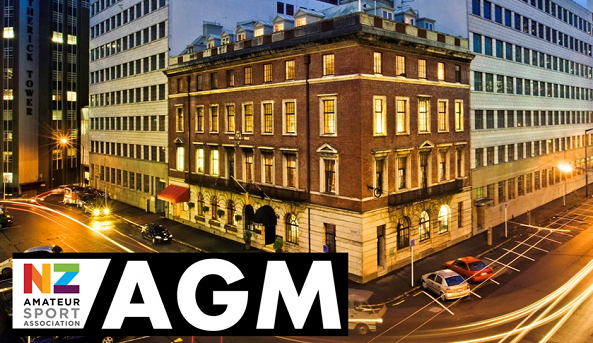
Formal notice of the meeting, including any notices of motion and details for attendance will be provided (in accordance with cl. 7.2 of the Association’s Constitution), closer to the date.
Tauranga City Council Proposes New Levies On Sport Clubs ...
Charges to sport clubs of $258 per hour, per field/wicket, per week are proposed by Tauranga City Council in its long-term-plan (2024 to 2034). The Council says the fees reduce the reliance on rates to maintain these facilities, however city clubs say that the levy will reduce participation.

(Access to ratepayer owned sport facilities may become limited to user-pays)
Under the Council’s proposal, in the first year, only training (not games) will be charged at $225+GST per hour, per field/wicket, per season for adult/senior participants only. In the second and third years (2025/26 and 2026/27), the fee will increase to include both training and games. The funds collected through these fees will be directed toward covering the operational expenses of the sports fields, reducing the reliance from rates to meet this cost. Many would argue that the purpose of rates is to meet these operational expenses, with the underlying issue being the Council’s spending priorities.
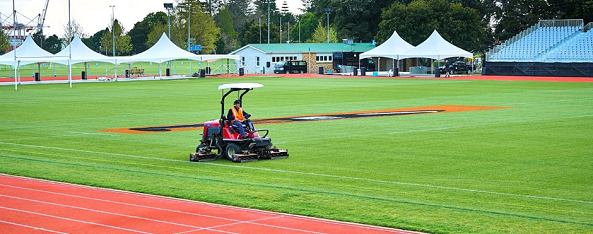
(Should rates be expected to cover operational expenses for sports fields?)
You can read more here.
Meanwhile, Wellington City Council Ponders Cuts To Sport Facilities ...
Wellington City Council’s gross debt was $1.25 billion at the end of the 2023 financial year and is forecast to quickly grow to $1.5 billion, with the Council paying an average of $25 million annually in interest over the past five years for the money it has borrowed. The annual interest cost alone consumes over 20% of the annual rates collected across the municipality.

(Wellington’s municipal debt is ballooning with risks to community sport)
In it's 2021 to 2031 long-term-plan, the Council agreed that up to 15% of the total cost of sports fields would be covered by user-pays fees and charges with the remaining 85% to be covered by general rates, with an independent review of this policy demanded by community sports in the region now being undertaken, (due to be completed in March this year).
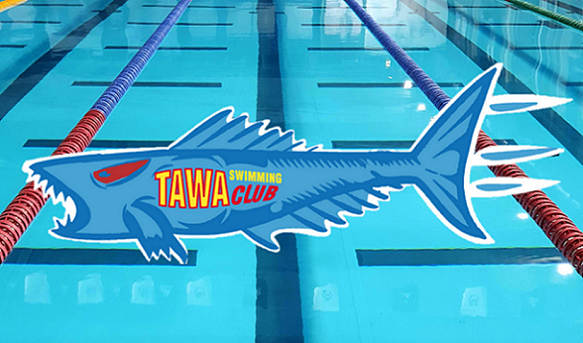
(The Tawa Swimming Club Inc. was one club impacted by the Council’s proposals)
Among recent proposals being considered by the Council to reign in ballooning debt, were cuts to community swimming facilities, which are used by clubs such as the Tawa Swimming Club which has provided tuition and training to young swimmers in Wellington’s northern suburbs at Tawa Pool since 1971. A community backlash has forced the Council to reconsider its priorities.
Discussion With Government On Legislative Reform Continues ...
The Association continues to progress its discussion with Members of Parliament regarding urgent reform to the Incorporated Societies Act 2022, with the expectation of remedial legislation being introduced in the current parliamentary term.
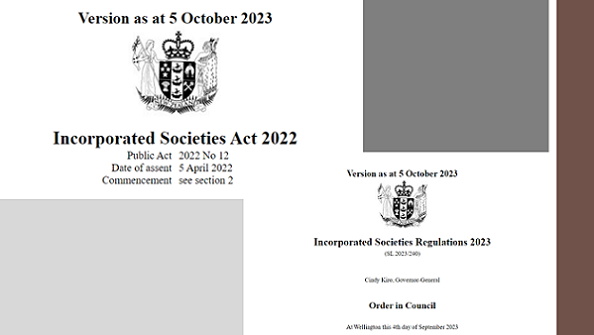
(A two year extension for compliance is among recommendations being made)
Among detailed recommendations proposed to many of the 270 sections of the 2022 Act, the Association is recommending, (given the seasonal nature of community sport organisations in particular), that the re-registration period be extended by a further two years, to apply no later than 1 April 2028. This will allow time for the various necessary amendments to the Act to first be made and for incorporated community sport organisations to then consult with their members and make necessary constitutional changes.
Viewpoint : Who Owns “Sport”? ,,,
The Association recently received a query from a not well-known national sport organisation which was keen to know how it could gain formal national recognition as “a sport.” The query posed a further interesting question of who decides what is a “sport” for it to be recognised?

(“Sport” is not defined by legislation, or controlled by any crown agency)
Readers of this newsletter will be aware that there is no legislation (or crown agency) which has this power. Any group which decides their activity to be a “sport” can make that determination.
If established as an incorporated society or registered as a charity, a sport can gain statutory legal recognition, through its objects/rules, with community grant funders requiring this to occur before a sport can apply for funding. Inland Revenue is also able to grant income tax exemptions on a sport’s incorporation or registration as a charity.

(Sports can gain legal recognition through the process of incorporation)
“State Of The Sector” Survey To Give NFPs A Voice ...
Community Networks Aotearoa (CNA), is intending to shortly (around 1 April) launch the sixth biennial State of the Sector Survey, inviting all not-for-profit entities within New Zealand's community and voluntary sector to take part. The survey is released every two years to provide a consistent snapshot of the financial and operational health of the not-for-profit (NFP) sector, and has been undertaken since 2014.

The Association supports CNA in undertaking this important research and will provide details of how to participate for those community sport organisations which would like to do so. (The Association will provide details of the 2024 "National Sport Club Survey", in coming weeks).
Asia New Zealand Foundation – Student Sports Fund ...
The Asia New Zealand Foundation’s Student Sports Fund provides opportunities for secondary and tertiary students to engage in cultural activities while travelling to Asia for sports-related activities. By providing students the opportunity to extend their experiences in Asia to include cultural activities, the Foundation aims to ignite students curiosity to learn more about the country they are visiting and inspire them to share their experiences with fellow students, friends and family on returning to New Zealand.

The fund is for: secondary school teams; tertiary students and teams representing New Zealand and/or their tertiary institution internationally through University and Tertiary Sport New Zealand. While the latest application round has closed, the next round will open late August 2024.
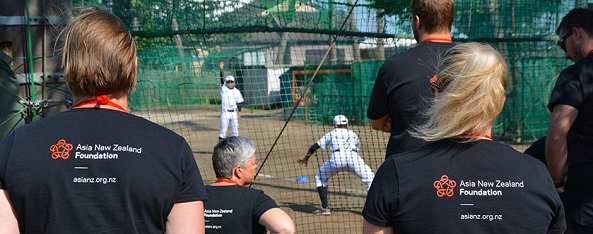
You can find out more here.
From The Archives ...
ATHLETICS
NEW ZEALAND HERALD, VOLUME XXXVIII, ISSUE 11614, 30 MARCH 1901, PAGE 7
“The doings of the New Plymouth amateur sprinter, Webster, who has been credited with doing even time for the 100 yds on more than one occasion, are being followed with keen interest by Aucklanders, and several enthusiasts have asked me who Webster is.
As far as I can gather, "Pat" Webster is a clerk in the Bank of New Zealand, a member of the Wanganui Amateur Athletic Club, and a keen sport. Some of his Taranaki admirers would, I am informed, very much like to see Webster meet the Auckland champion over 100 yds, 220 yds, and 440 yds, and are very sanguine of his chances of downing the Northern crack.”
Leslie Bolland (“Pat”) Webster was born 1 December 1879, the fifth eldest of the seven sons of William Dawson and Mary (nee Watson) Webster. William and Mary raised eleven children. Pat’s father was born in the Bay of Biscay on the ship the "Amelia Thompson" enroute from London to New Zealand in 1841, later becoming a successful trader between Taranaki and Australia in the “homely commodity” of potatoes.
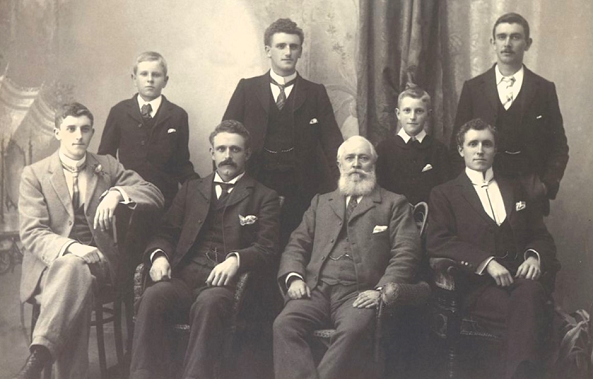
(William Webster with his seven sons, “Pat” is seated on the left)
A bank clerk (and New Plymouth High School old boy), Pat married Bertha Maud Thompson on 28 February 1905, temporarily emigrating to Sydney before returning to New Plymouth the following year and becoming an auctioneer. Together they had three children, Nigel, Vivienne and Monica. The family lived at 102 Vivian Street, New Plymouth. Webster ran under the colours of the Wellington Amateur Athletic Club, also showing a lot of speed on the rugby field as a wing three-quarter, while also taking up the whistle as a rugby union referee.
In March 1903, at the fourteenth New Zealand Amateur Athletic Championships in Dunedin, Pat won the 100 yards in 10 secs, the 220 yards in 22 3-5 secs (a New Zealand record), and the 440 yards in 50 2-5 secs (also a New Zealand record). His time in the 440 yards had been done only once before at a championship meeting, by the Australian W. T. Macpherson and it remained as the best time in the New Zealand championships until 1926-27, being for many years a New Zealand record. Among Pat's most cherished possessions were the two framed certificates hanging from the wall in his office, crediting him with his two New Zealand records.
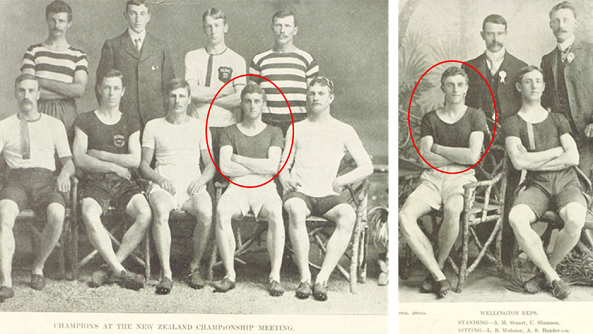
(Pat Webster, circled, a New Zealand champion over 220 and 440 yards)
It was reported that Webster's success on the track could be attributed to the fact that, “he invariably endeavoured to win from pistol fire to the tape, thus always being able to call up his reserve, which so many athletes leave on the training track.”
In the early 20th century, potatoes were considered an essential part of an athlete’s diet, “to keep the blood in good condition” and (perhaps unsurprisingly), Pat pursued the family interest in tubers. He became a national authority (and judge) on potatoes, particularly noted for his advice during the “Phythopthera Infestaus” (Potato Blight) of 1935, while also (at other times) undertaking various tests on the optimal “table tuber”, with the “Sutton’s 26” consider by Webster to be suitable for table use.
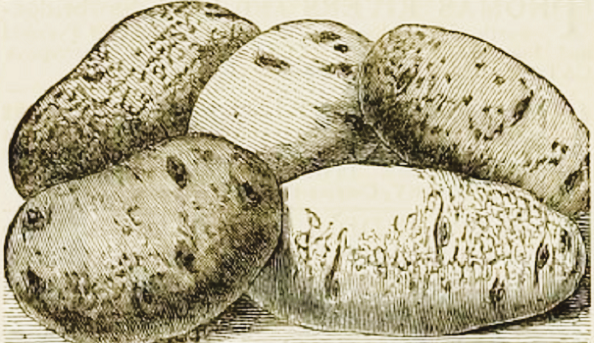
(Potatoes were said to keep an athletes blood in "good condition")
In October 1944, Pat delivered an address to the AGM of the Wellington Amateur Athletic Club on “the spirit of amateurism in sport”. He died on 17 February 1954 at the age of 74 and is buried in New Plymouth’s Te Henui cemetery.
The Final Word ...
"Life doesn't give you all the practice races you need."
(Jesse Owens)